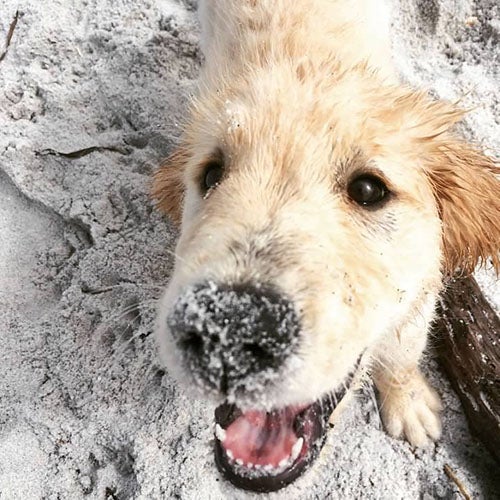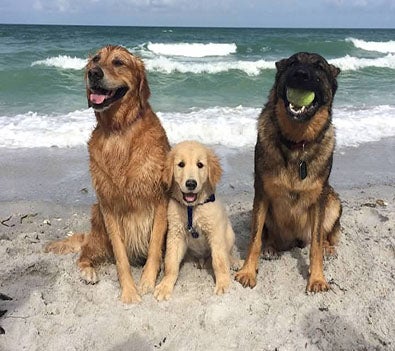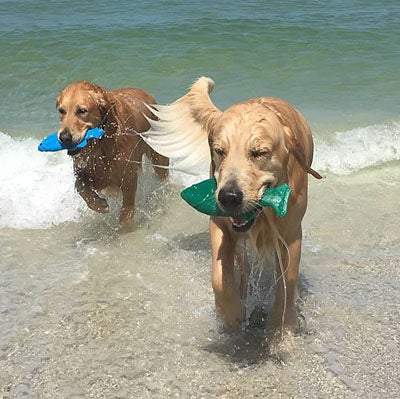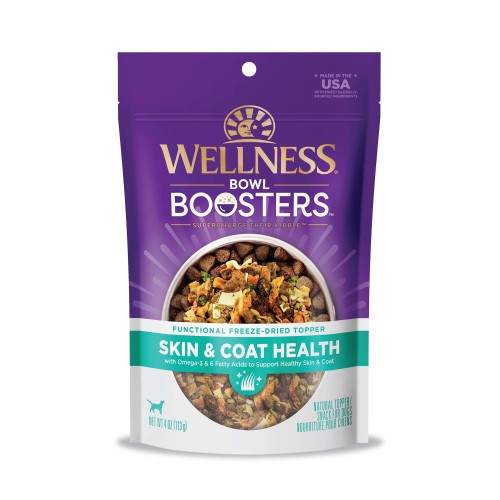July 19, 2019
Top 10 Tips for Taking Your Dog To The Beach
Summertime marks the season of adventures; warm temperatures, longer days, and the great outdoors just waiting to be explored! And for those of us with dogs, we plan on spending all of that time outside with our furry family members in tow.
Naturally, the beach is a popular choice for beating the heat! But just as there are precautions we must take to ensure we are protected during our time in the sun, there are things our four-legged beach buddies need to stay cool and calm, too!
Here is a list of 10 things we make sure to check off when hitting the beach with our furry pack members!
1) Preparations

While fun memories and romping around in the waves await, it’s important to be prepared so you can keep your dog safe. Not only do we make sure we have what we need to care for our pups, but we want to ensure we are respectful of the environment and others around us, too.
• ID & RABIES TAGS: Make sure your dog has his collar on, with a proper I.D. attached. In the event you are separated, you’ll want to be certain that your dog has proper identification so you can quickly be reunited.
In many states, is against the law to not have your dog up-to-date on their rabies vaccination, so be sure that the tag you received upon vaccination (with the license number) is secured to their collar as well.
• DOG WASTE BAGS: When “nature calls,” be sure to have plenty of bags on hand to clean up any waste with. Not only would it be unpleasant to step in, but it’s important that we do our part in keeping our beaches clean! We also strive to be good examples of responsible dog-owners, so that we (and many others) can continue enjoying the beach with our dogs in the future.
2) Ray(s) of sunshine
Depending on your latitude, altitude, and the season, it’s generally considered that the sun’s rays are strongest between the hours of 10:00 a.m. and 4:00 p.m. Although some breeds are more prone to sunburn than others, with the sun at it’s peak during this time, chances of heat stroke and heat exhaustion also increase (for both human and canine alike).
If possible, a mid-morning beach trip can be a safe alternative to over-heating during the afternoon hours.
3) The “other” H2O
There’s a saying among sailors, “Water, water everywhere… but not a drop to drink.” You don’t want salt water to be your dog’s only option for quenching his thirst, so be sure to bring plenty of fresh water. Just like us, it doesn’t take long for a dog to become dehydrated in the heat. Ingesting salt water will speed up dehydration, and since it’s likely that your dog will inevitably consume some, it’s important to be mindful of how much fresh water they are drinking!
4) Shade

Along with the offering plenty of fresh water to drink, having shade available to your dog will help provide relief from the blazing sun. Providing shade can help your dog keep their body temperature cool and let them rest out of the direct sunlight when needed.
To provide shade at the beach, there are a variety of products you can choose from, such as pop-up tents, beach tents, umbrellas, and sunshades. These products are made specifically for beach conditions (such as wind and moisture) and are intentionally designed to be secured in the sand.
5) Leash Laws
Before unleashing your pup, be sure to check the county laws of the beach you’re visiting. Many “dog-friendly” beaches still require your pup to be on a leash, so double checking this will save you from potentially getting fined. If we happen to be visiting a “leashed beach”, we like to bring extra-long leashes to give them a little more freedom.
If your dog plans to be off-leash while at the beach, keep these few things in mind to ensure safety for everyone:
• Recall: you want to be confident your dog will come when called, no matter what distractions are present.
• Supervision: a dog off leash may wander off or swim too far out, so be sure to closely supervise them at all times to prevent any accidents or danger from occurring.
• Socializing: if you’re visiting a dog-friendly beach, chances are, there will be other dogs present. Make sure your dog is friendly and outgoing around new dogs and comfortable with sharing his toys.

6) Life Vests
Getting your dog a life vest (or “life jacket”) goes beyond protecting them from drowning or getting too fatigued in the water. While it serves an obvious purpose for novice swimmers, it can also help prevent your dog from getting saltwater poisoning. A life vest naturally positions the dog’s head above the water, which makes them less prone to swallowing salt water as they swim. Thus, it is a great item to have, especially if you plan on spending a whole day or multiple days at the beach.
7)Toys

Whether your pup prefers the sea or shore, bringing the appropriate toys along can turn a good day into a great one! The typical frisbee or tennis ball is a great option for playing on the shore. As for the sea, retrieval-type toys that float and typically come in bright colors are easy to spot among the surf.
8)Safety
In addition to having the right supplies and staying hydrated, being mindful of the terrain when visiting the beach with your dog will help keep them safe and injury-free.
• Sand: depending on the time of day, the sand can become incredibly hot, and can potentially burn human feet and the pads on a dog’s paw. Staying near the water (on the wet sand) or in the shade during this time is a simple solution.
• Sandspurs: it’s likely that the beach you visit will have grassy areas. While these areas may be away from the crowds and ideal for letting your dog relieve themselves, sandspurs can also be present. Getting these stuck in their paws can cause discomfort and sometimes bleeding. Be sure to check the surroundings before allowing your dog in those areas.
• First Aid: having a first-aid kit on hand can ease any worries and provide the necessary supplies that may be needed in the event of an emergency, (such as an injured paw pad or allergic reaction) or offer some relief until you can get your dog to a vet.
9)After-care
To ensure our dogs are healthy and happy after a day at the beach, there’s a few things we like to do, starting with a bath. Bathing your pup after the beach will not only remove sand and rinse the sticky salt water out of their fur, but it will also give you a chance to make sure they don’t have any cuts or injuries. Second, providing plenty of water during the next few hours will also help your pup catch up on any hydration they lost or may need. Be sure to provide lots of potty breaks in the following hours as well. Last, we always use an ear cleaner/dryer afterwards to help prevent ear infections from occurring.
10) Extras
While the following items certainly aren’t necessary, we have found that these few things assist in keeping our dogs healthy and happy during their beach trips!
• Up to date vaccines
• Flea & Tick preventative
• Maintain a respectful distance from any turtle nests
• Bring extra toys in case one is lost or broken
• Take time for regular breaks in the shade with your pup
• Pack their favorite treats (Our pups love Wellness CORE dog treats)
We hope this check list helps you plan ahead so you and your dog can “shorely” have a fabulous beach day. Have fun, be safe, and don’t forget to catch the sunset!







